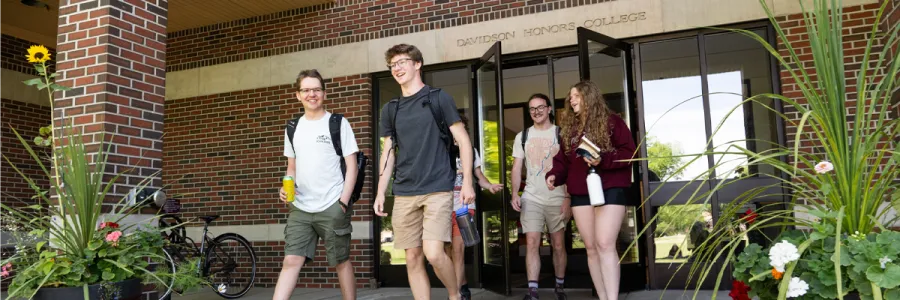Requirements
Students who graduate from the Davidson Honors College earn “University Scholar" distinction after working their way through a minimum of eight requirements that entail specific coursework, honors electives, experiential opportunities, and a culminating honors capstone project. On average, students take one honors course a semester or two a year. If your timeline to graduation is condensed, students may need to take more honors courses per semester.
-
Year 1
-
HONR 120: Introduction to Honors| 1 credit
First-year seminar taught by the dean to kick off your Honors experience. E-Portfolio* development begins here. Course is required for all first-year students. Transfer students are exempt. -
HONR 121L: Ways of Knowing | 3 credits
Seminar course exploring the human experience across millennia through the lenses of philosophy, science, religion, and literature. Satisfies two general education requirements: Literary & Artistic Studies and Writing Across the Curriculum.
*E-PORTFOLIO: The honors e-portfolio will include artifacts that demonstrate important activities and learning outcomes from their Honors courses and experiences. Support for completing this project will begin in HONR 120 and continues with ongoing Honors advising.
Year 1-4
-
HONR 394: Interdisciplinary Colloquia | 3 credits
A series of interdisciplinary offerings that explore an array of topics from diverse perspectives, taught by top faculty. -
EXPERIENTIAL LEARNING | 2+ credits
Options include fieldwork, internships, supervised research, study abroad, student teaching and more. -
HONORS ELECTIVES | 7-9 credits
Options include departmental honors offerings, general education honors courses, experiential learning, and honors special topic and interdisciplinary courses. The DHC offers over 50 classes each semester!
Year 3-4
-
CAPSTONE PROJECT | 3+ credits
Faculty mentor-supported, original research or creative scholarship in your academic area(s) of interest. Only one capstone required for each student. Must include a final artifact (end-product) and a formal, public presentation. Students may have their project published through the University’s research database.
-
-
Required Grade Point Average
For students enrolling in honors prior to Fall 2025, the institutional grade point average to continue in honors and graduate as a University Scholar is a 3.0.
For students enrolling in honors in and following Fall 2025, the institutional grade point average to continue in honors and graduate as a University Scholar is a 3.2.
The institutional grade point minimum for honors scholarship eligibility and renewal is 3.4.
Academic Probation
Students whose institutional GPA falls below the required GPA at our summer audit will be placed on for the next academic year. During honors academic probation, students should meet with an honors advisor to develop a plan to improve their academic standing and maintain progress in honors. After a year on probation, if their institutional GPA is still below the required GPA, the student’s honors cohort code will be dropped unless they appeal to remain on probation. Note that in order to maintain good academic standing in the DHC, students should also be making steady progress toward honors college credit and course requirements, which is one honors course per semester or two per year.
If you believe you have a compelling case and would like to appeal the GPA or honors credit requirement, you may do so through the .
-
Unless expressly permitted in a course syllabus, assignment description, or other written instructions provided by an Honors faculty member, Honors students are responsible for creation and validation of their work and should abide by the following policies.
- Exams: Generative AI may NOT be used for any purpose in an exam. It may be used for studying (e.g., to create flashcards, ask review questions, and other uses designed to help better understand course material).
- Course Work: Generative AI may be used to perform research in ways similar to search engine functions (i.e., Google), for correction of grammar, proofreading, locating sources, and similar functions. The software may NOT be used to compose any part of submitted assignments or written responses, except as specified by course syllabi, assignment prompts, or instructors.
- Personal Reflections/Scholarship Applications/Admissions Materials: Generative AI may NOT be used to compose written responses for scholarship applications, applications to the honors college, applications for student leadership positions, job applications, or other forms/assignments that require a personal, reflective response. You may use it for grammar or proofreading.
- Capstone: Generative AI use for research must be approved by the DHC in advance and in writing and disclosed in the final product, including an explanation of their use, the tool(s) used, full text of prompts, and full texts of responses. Your final artifact for your capstone may NOT be developed using generative AI. The following guidelines apply:
- If you copy language verbatim from a Generative AI tool, you must use quotation marks and provide a citation note to indicate that the words used were not your own, including the prompt.
- If you paraphrase output from a Generative AI tool, you must provide a citation note indicating that the idea, format, and syntax were not originally your own.
- Failure to provide proper attribution and citations violates the academic honesty policies and will result in a student being subject to disciplinary measures.
Use of AI that is inconsistent with the above expectations may result in academic consequences. Using generative AI to write materials for you may be to your own detriment in the learning process. Check out this article from MIT: .
Citation: Modified based on materials from Honors Program
-
Students will build their honors e-portfolio in Introduction to Honors or Personal and Professional Development courses. If you do not take either of these courses, it is your responsibility to build your e-portfolio on your own. Please reach out to dhc@umontana.edu if you have any questions.
The purpose of the e-portfolio is to provide students with the opportunity to reflect on their academic progress, ask questions for further inquiry, consider their academic and professional interests, and forge connections between subjects that might then lead them toward capstone projects in their fourth year. This is an opportunity for students to archive, collect, document, and celebrate artifacts that demonstrate their achievement of the DHC learning objectives. The e-portfolio should be a valuable resource for students in future academic and professional endeavors.
A complete e-portfolio will include:
- Home page
- About Me
- Artifacts (e.g., uploaded assignments, projects, etc.)
- One from each honors experience at UM (e.g., course, internship, study abroad, etc.)
- Capstone Project
- Final Honors Reflection
- Optional
- Professional materials (e.g., resume, cover letter, LinkedIn page)
- Scholarship materials (if applicable)
- Personal statement
- Writing samples
- Photography/Art/Video
- Experiential learning reflections
- Publications and presentations

